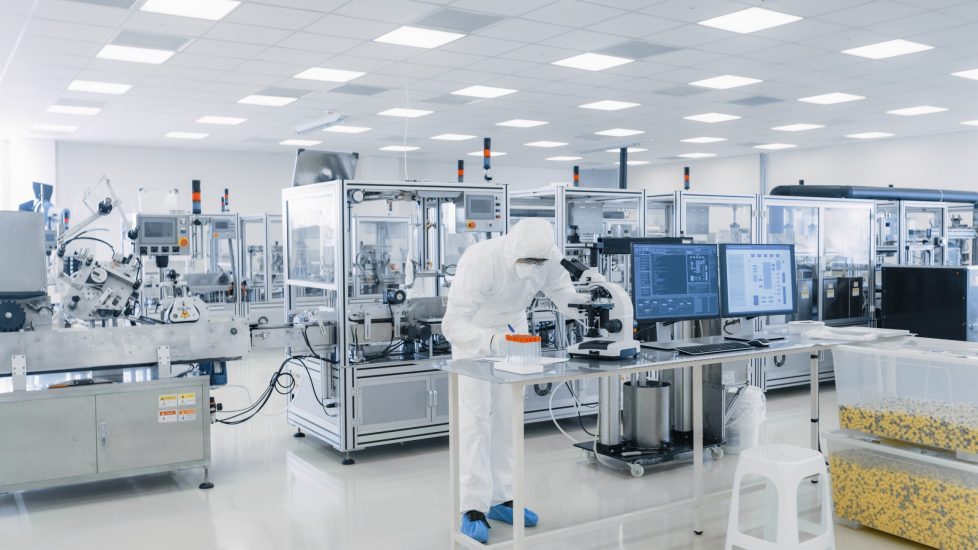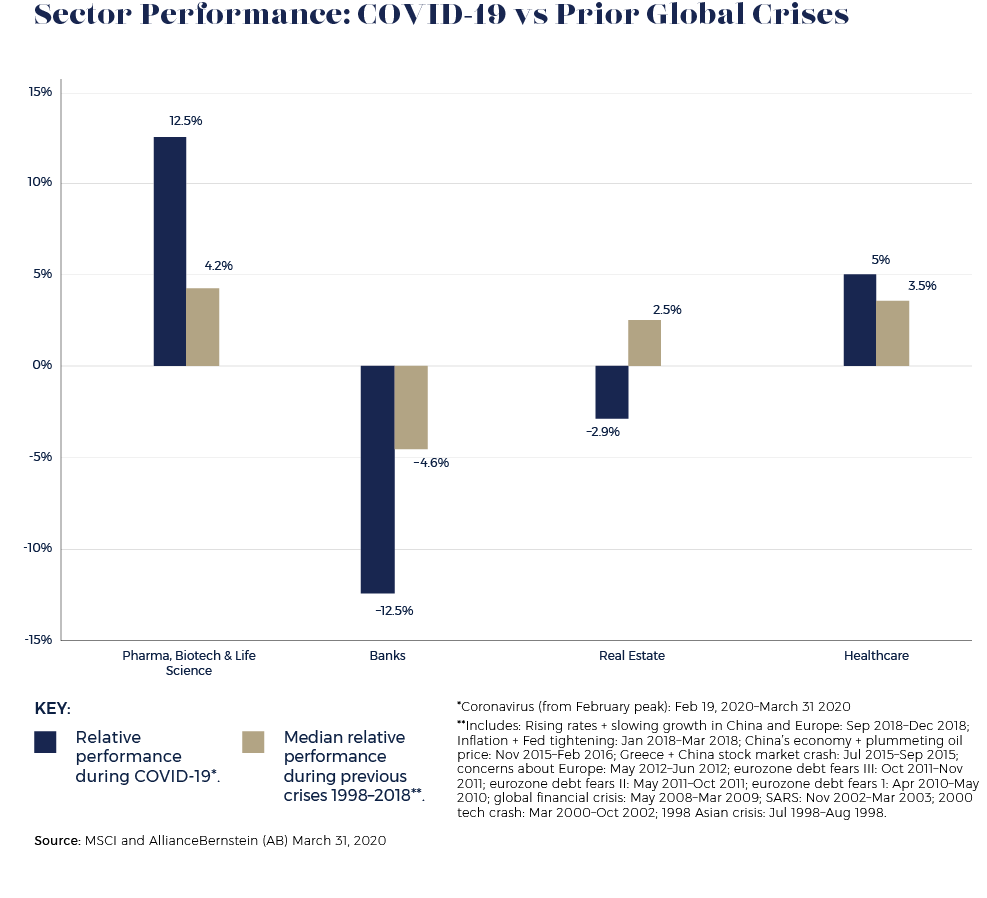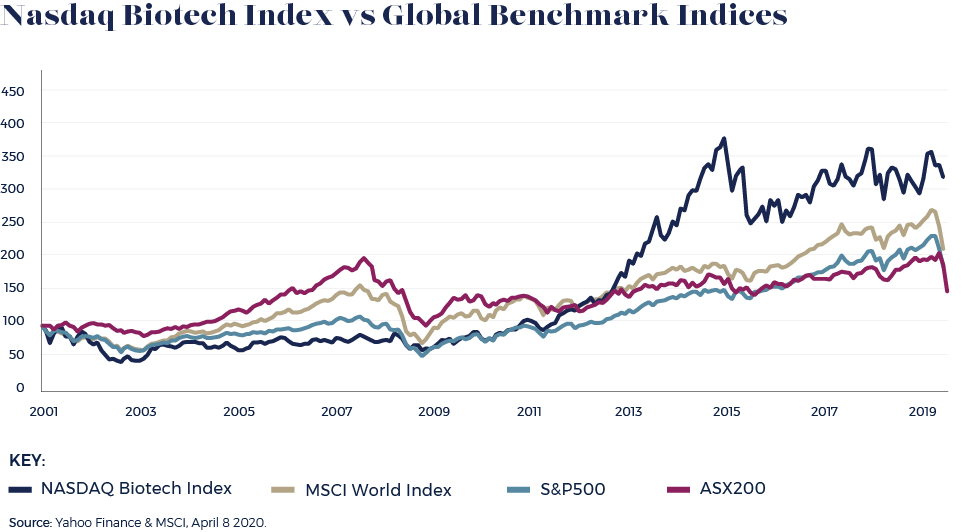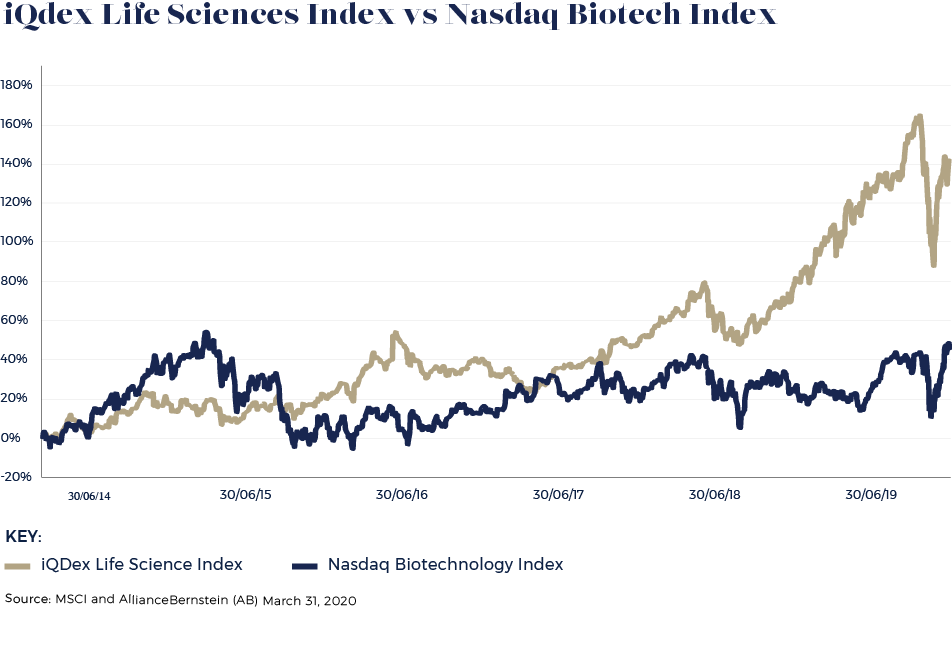Article
The Sector Paving the World’s Exit from COVID-19
18 May 2020
As the COVID-19 pandemic causes uncertainties across economies and capital markets globally, seasoned investors and investment bankers are looking to one sector that’s proven time and time again to hold its solid ground in times of crisis.
While healthcare has always been known to be a defensive sector, the biotechnology sector driving the scientific breakthroughs essential to the creation of new medicines has stepped firmly into the spotlight.

The sector that’s ‘good in a crisis’
The bioscience sector feeds a pipeline of pharmaceutical breakthroughs into healthcare, which is why the industry is attractive to investors during steady economic periods. But this innovative sector has shown it’s good in a crisis too – and not just one resulting from a pandemic.
MSCI World Industry data[i] shows the ‘pharmaceuticals, biotechnology and life sciences’ sector outperforms key sectors during global crises from 1998 to 2018 and the COVID-19 pandemic.
The data reveals the bioscience sector to be crisis-agnostic in its resilience, most likely because of its pure focus on innovation.

“The ability to withstand these historic market pressures has only further propelled the bioscience industry’s value, which was already indicating encouraging projections,” Director of Ethical Bioscience Investments and CEO of US investment bank iQ Capital Keith Bliss said.
“Regardless of current uncertainties, it is clear that COVID-19’s long-term market impact on the life science sector will be transient, as the industry remains on the forefront of value creation.”
Tailwinds push steady demand for healthcare innovation
Even without the urgency of a pandemic, the consistent demand for medicines to treat and prevent life-threatening disease means the performance of the biotechnology sector does not appear to be dependent on economic cycles.

In the years leading up to the COVID-19 crisis, a steady increase in tailwinds has been supporting and sustaining long-term growth in the biotechnology industry. With longer life spans and the rise of the middle-class in more nations across the world, the demand for efficacious pharmaceutical treatments, accurate point-of-care diagnostic testing and easily scaled production of medical supplies to help combat conditions associated with ageing and lifestyle has increased dramatically.
The bioscience sector is the engine driving essential medical innovations forward, often into the doors of big pharmaceutical companies who are ready and able to commercialise these products and deliver them to the patients. Whereas pharmaceutical companies create medicines through chemical synthesis, biotechnology researchers develop medicines from living organisms using cellular and bimolecular processes. Breakthroughs in bioscience have shown great promise in treating complex disease mechanisms as opposed to just their symptoms, such as autoimmune conditions, cancers and contagious infectious diseases.
As more and more investors anticipate the global mandate toward better medical preparedness, investors are seeing the crucial link between scientific innovation and value creation in healthcare. Without biotechnology, the development of vaccines essential to stopping sickness on a global scale would not be possible.
Record pre-pandemic growth paves the way for global health
Because of the ongoing need for medical innovation, the bioscience sector has grown considerably.
In particular during the five years prior to COVID-19, the sector was experiencing significant growth across major economies from 2014 to 2019. In Australia in 2018, biotech industry revenue was predicted to increase to AUD $8.8 billion by 2024, with industry value added (the measure of the industry’s contribution to the economy) expected to grow by an annualised 4.1% over 10 years, outpacing the annualised GDP growth of 2.7% over the same period[ii].

In the US, bioscience-related patents increased by nearly five per cent since 2014, and academic research and development spending in biosciences increased by more than five per cent. In 2019, life sciences deal-making reached an all-time high in the US with life sciences mergers and acquisitions (M&A) activity, driven by pharmaceutical buyers, totalling an unprecedented US$357b[iii]. In addition to this, record-high venture capital investments in the bioscience industry topped USD $20 billion[iv].
This robust activity positions the bioscience sector better than ever to push the world toward a healthier post-pandemic society.
“Scientific innovation and investment into next-generation medicines has never been more appreciated than now,” Mr Bliss said.
“In the climate, investors are seeing the first-hand value of developing life-saving therapies. COVID-19 has shined a light on how the life sciences industry protects the world by creating a better and safer place for all.”
At Ethical Bioscience Investments, our mission is to provide unique high-yield opportunities for sophisticated investors looking to invest across the global bioscience sector.
A member of bioscience enterprise The iQ Group Global, EBI investments are carefully vetted and validated by our scientific and investment committees, comprised of highly-qualified professionals experienced in the monetisation, corporatisation, commercialisation, risk profiles and value creation process of life science innovations. With our unique investment strategy, our experts carefully select and validate late-discovery or pre-clinical stage life science companies, with assets that have potential for significant value appreciation.
[i] Defensive Stocks Redefined in COVID-19 Sell-Off, MSCI and Alliance Bernstein, March 31 2020.
[ii] IBISWorld Industry Report X0001, Biotechnology in Australia, August 2018
[iii] ‘All-time M&A record for life sciences in 2019 as companies increased therapy area focus and closed growth gaps’, 2020 EY M&A Firepower report, January 2020.
[iv] National Bioscience Industry Report Shows $2T Economic Impact, Accelerated Venture Capital Investment & Job Growth, Biotechnology Innovation Organization, June 2018.


